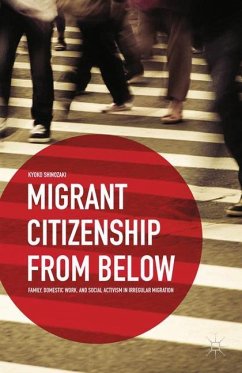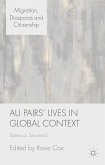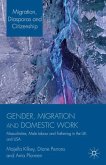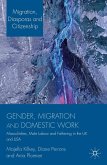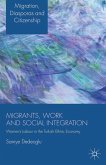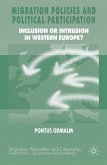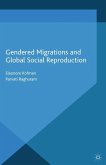Migrant Citizenship from Below explores the dynamic local and transnational lives of Filipina and Filipino migrant domestic workers living in Schönberg, Germany. Shinozaki examines their irregular migrant citizenship status from 'above', which is produced by complex interactions between Germany's welfare, care, and migration regimes and the Philippines' gendered politics of overseas employment. Despite the predominant representation of these workers as invisible, these spatially immobile migrants maintain sustained transnational engagements through parenting and religious practices. Shinozaki studies the reverse-gendered process of international reproductive labor migration, in which women traveled first and were later joined by men. Despite their structural vulnerability, participant observations and biographical interviews with the migrants demonstrate that they enact and negotiate migrant citizenship in the workplace, transnational households, religious practices and through accessing health provisions.
"This book is an excellent account of the way irregular migrants make sense and negotiate the structural constraints resulting from their illegal status. ... The book is highly recommended to those who want to learn more about irregular migrants in general, but also about work relationships in domestic and home-based care sector, transnational parenting and the reversed gendered process of international labour migration." (Andrei Stavila, Ethnic and Racial Studies, Vol. 39, January, 2016)
"Migrant Citizenship from Below offers a significant addition to discussions on migrant domestic work with its focus on irregular migrants in Germany. It describes the gendered experiences of Filipino men and women, including mothers and fathers, as domestic workers, parents, and activists. Offering the first gendered comparative account of domestic worker migration in Europe, this book is a welcome contribution to the literature on migration." - Rhacel Parreñas, Professor of Sociology and Gender Studies, University of Southern California, USA, and author of Servants of Globalization: Migration and Domestic Work (2001)
"This exemplary ethnography of Philippine irregular migrants in Germany reveals the virtues of long-term research made possible by high levels of trust between subjects and researcher. Shinozaki's rich empirical account and the sophisticated theoretical grounding informing the idea of migrant citizenship results in a major contribution to our understanding of migrants forced to live in the shadows. Without downplaying the difficulties of their lives, she shows these workers to be agents of their own lives." - Peter Kivisto, Richard A. Swanson Professor of Social Thought, Augustana College, USA
"Kyoko Shinozaki's book provides an insightful account of how new citizenship practices are forged and constitutes a significant contribution to our understanding of citizenship as transformative and inclusive, intersecting with gender, class, migrant status, and level of education." - Mirjana Morokvasic-Müller, CNRS and Université Paris Ouest, France
"Kyoko Shinozaki's book is an excellent contribution to the burgeoning literature on Filipino migrant domestic workers and their transnational family-lives. The skillful presentation of a broad range of ethnographic data makes this book special. Shinozaki's vivid portrayal of the enactment of Filipino migrants' citizenship through the lens of their working and family life renders this book a sophisticated exploration of gender, transnational livelihoods, and irregular migration, a must read for students and scholars interested in global care issues." - Helma Lutz, Goethe University Frankfurt, author of The New Maids: Transnational Women and the Care Economy (2011)
"Migrant Citizenship from Below offers a significant addition to discussions on migrant domestic work with its focus on irregular migrants in Germany. It describes the gendered experiences of Filipino men and women, including mothers and fathers, as domestic workers, parents, and activists. Offering the first gendered comparative account of domestic worker migration in Europe, this book is a welcome contribution to the literature on migration." - Rhacel Parreñas, Professor of Sociology and Gender Studies, University of Southern California, USA, and author of Servants of Globalization: Migration and Domestic Work (2001)
"This exemplary ethnography of Philippine irregular migrants in Germany reveals the virtues of long-term research made possible by high levels of trust between subjects and researcher. Shinozaki's rich empirical account and the sophisticated theoretical grounding informing the idea of migrant citizenship results in a major contribution to our understanding of migrants forced to live in the shadows. Without downplaying the difficulties of their lives, she shows these workers to be agents of their own lives." - Peter Kivisto, Richard A. Swanson Professor of Social Thought, Augustana College, USA
"Kyoko Shinozaki's book provides an insightful account of how new citizenship practices are forged and constitutes a significant contribution to our understanding of citizenship as transformative and inclusive, intersecting with gender, class, migrant status, and level of education." - Mirjana Morokvasic-Müller, CNRS and Université Paris Ouest, France
"Kyoko Shinozaki's book is an excellent contribution to the burgeoning literature on Filipino migrant domestic workers and their transnational family-lives. The skillful presentation of a broad range of ethnographic data makes this book special. Shinozaki's vivid portrayal of the enactment of Filipino migrants' citizenship through the lens of their working and family life renders this book a sophisticated exploration of gender, transnational livelihoods, and irregular migration, a must read for students and scholars interested in global care issues." - Helma Lutz, Goethe University Frankfurt, author of The New Maids: Transnational Women and the Care Economy (2011)

